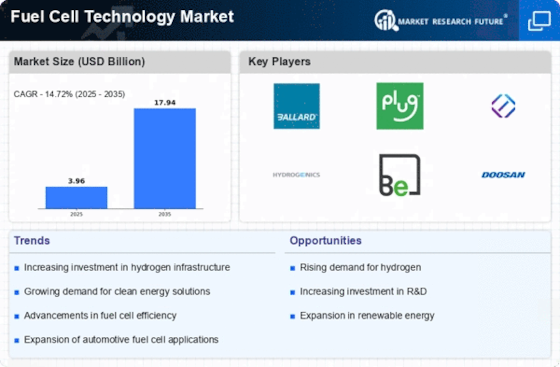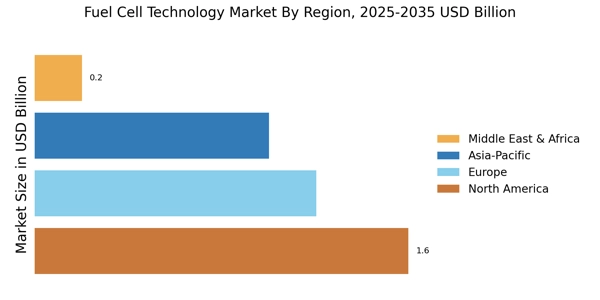Rising Environmental Regulations
Rising environmental regulations are significantly influencing the Fuel Cell Technology Market. As governments worldwide implement stricter emissions standards, industries are compelled to adopt cleaner technologies. Fuel cells, known for their low emissions and high efficiency, are increasingly viewed as a solution to meet these regulatory requirements. For example, the European Union has set ambitious targets to reduce greenhouse gas emissions by at least 55% by 2030, which is likely to drive demand for fuel cell technologies across various sectors. This regulatory landscape creates a favorable environment for the Fuel Cell Technology Market, as companies seek to comply with environmental standards while maintaining operational efficiency.
Increasing Adoption of Hydrogen Fuel Cells
The increasing adoption of hydrogen fuel cells is a pivotal driver for the Fuel Cell Technology Market. As industries seek cleaner alternatives to fossil fuels, hydrogen fuel cells are emerging as a viable solution. The transportation sector, particularly, is witnessing a surge in the deployment of hydrogen-powered vehicles, with projections indicating that the market for hydrogen fuel cell vehicles could reach over 2 million units by 2030. This shift is not only driven by environmental concerns but also by the need for energy security and diversification. Furthermore, the growing interest in hydrogen as a fuel source for heavy-duty applications, such as buses and trucks, is likely to bolster the Fuel Cell Technology Market significantly.
Growing Demand for Energy Storage Solutions
The growing demand for energy storage solutions is a significant driver for the Fuel Cell Technology Market. As renewable energy sources become more prevalent, the need for efficient energy storage systems is paramount. Fuel cells offer a promising solution for energy storage, particularly in balancing supply and demand. The market for energy storage is projected to reach over 200 billion USD by 2026, with fuel cells playing a critical role in this growth. Their ability to store excess energy generated from renewable sources and release it when needed positions fuel cells as a key technology in the evolving energy landscape, thereby enhancing the Fuel Cell Technology Market.
Investment in Renewable Energy Infrastructure
Investment in renewable energy infrastructure is another crucial driver for the Fuel Cell Technology Market. Governments and private entities are increasingly channeling funds into renewable energy projects, which often incorporate fuel cell technology as a complementary solution. For instance, the integration of fuel cells with solar and wind energy systems can enhance energy storage and reliability. Reports suggest that the global investment in renewable energy reached approximately 300 billion USD in 2023, with a notable portion allocated to fuel cell technology. This trend indicates a growing recognition of the role that fuel cells can play in achieving energy transition goals, thereby propelling the Fuel Cell Technology Market forward.
Technological Advancements in Fuel Cell Systems
Technological advancements in fuel cell systems are propelling the Fuel Cell Technology Market forward. Innovations in materials, design, and manufacturing processes are enhancing the efficiency and reducing the costs of fuel cells. For instance, the development of advanced catalysts and membranes is improving the performance of fuel cells, making them more competitive with traditional energy sources. The market for fuel cell technology is expected to grow at a compound annual growth rate of around 20% over the next five years, driven by these advancements. As technology continues to evolve, the Fuel Cell Technology Market is likely to witness increased adoption across various applications, including transportation, stationary power, and portable devices.

















